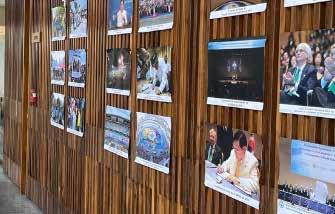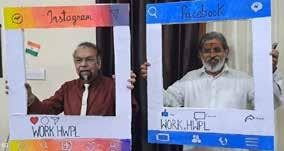March 14th Events to Celebrate HWPL’s 7th Annual Commemoration of DPCW Around the World
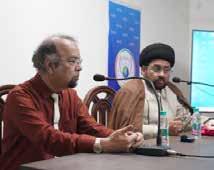

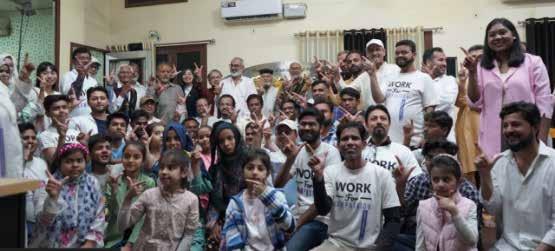

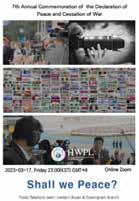

<Asia>

- India, Pakistan, Afghanistan
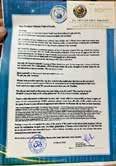
5 HWPL's 7th Annual Commemoration of DPCW
<African Continent>
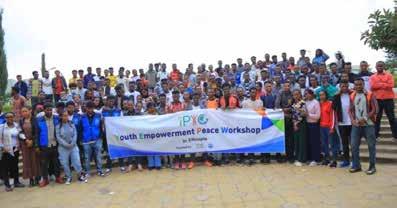

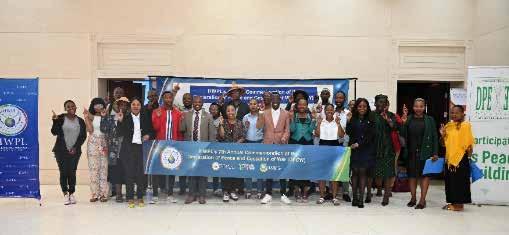
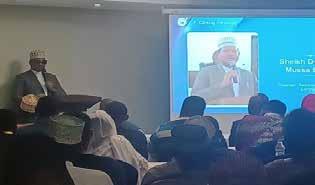
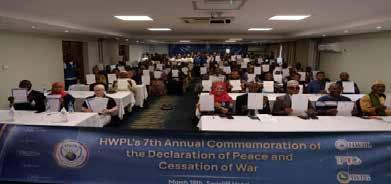
Tanzania, South Africa, Tunisia, Morocco, Democratic Republic of Congo, Ethiopia, Madagascar
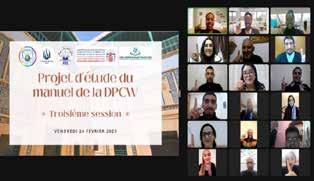


6
HWPL's 7th Annual Commemoration of DPCW
<Europe>
- United Kingdom, France, Netherlands, Croatia
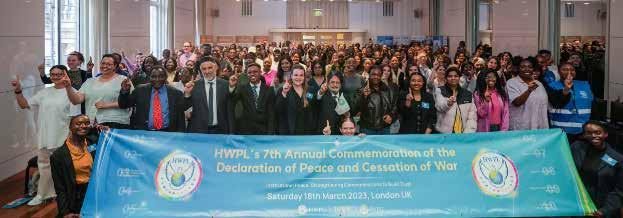
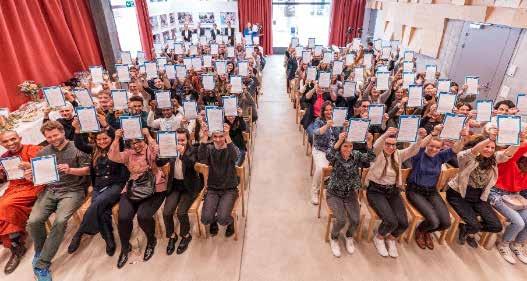
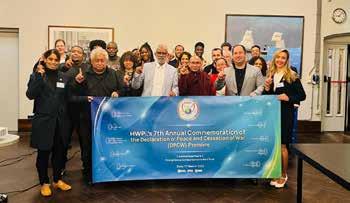
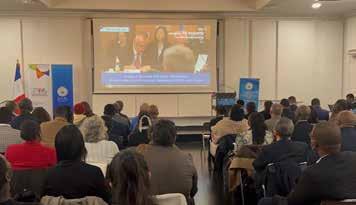
7 HWPL's 7th Annual Commemoration of DPCW
<Americas>

- United States, Colombia
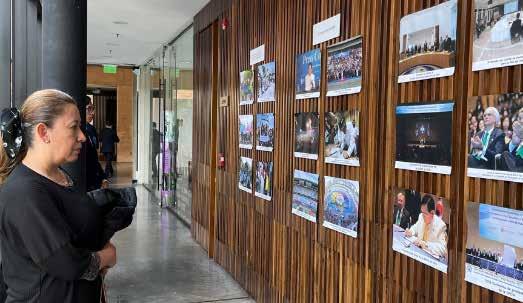
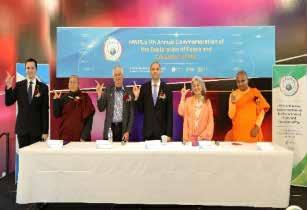
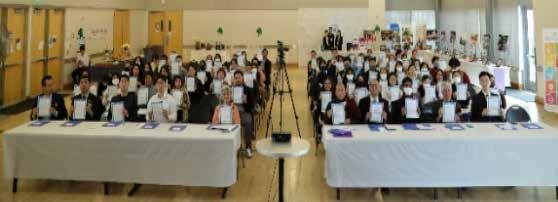

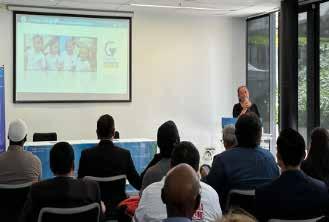

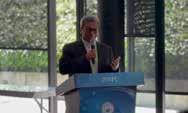
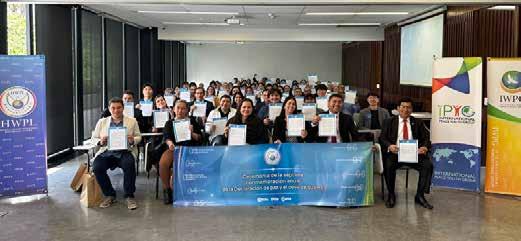
8 HWPL's 7th Annual Commemoration of DPCW
<Oceania>
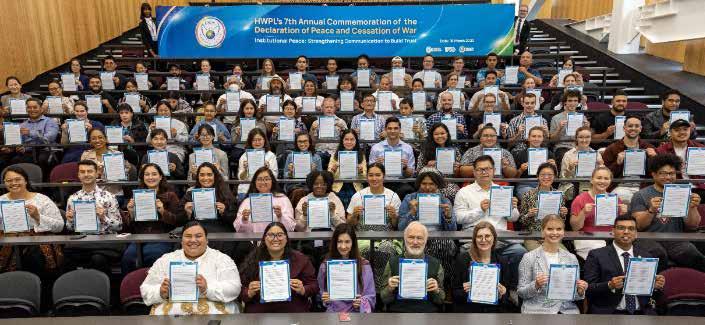

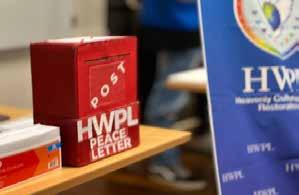
- Australia, New Zealand
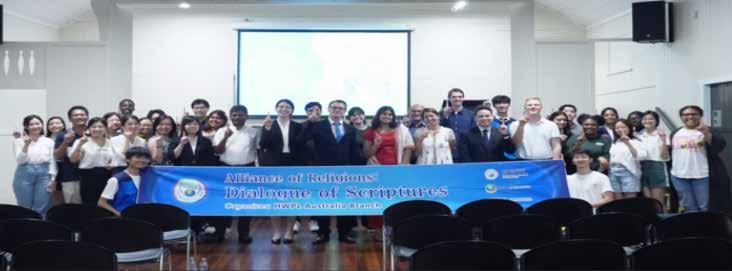
9 HWPL's 7th Annual Commemoration of DPCW
The First HWPL Religious Youth Peace Camp at Sulaymaniyah University, Iraq
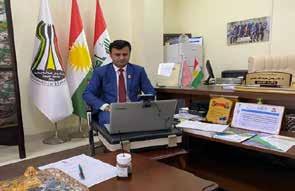
On February 21, 2023, the first HWPL Religious Youth Peace Camp was held at Sulaymaniyah University in Iraq, with about 100 religious leaders and students in attendance. Starting with speeches by the Dean of the Faculty of Islamic Sciences at Sulaymaniyah University and the Dean of the Faculty of Humanities and Social Sciences at Halabja University, panel presentations on the theme of “The Purpose of Religion” and student discussions were held. The event, which saw voluntary participation by students from Sulaymaniyah University and Halabja University, provided an opportunity to share various opinions on eradicating religious discrimination and resolving conflicts between religions, with the understanding that the purpose of religion is love, peace, and coexistence.
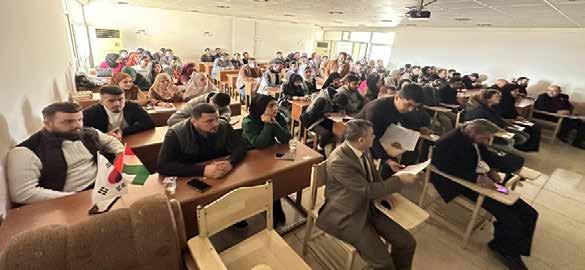
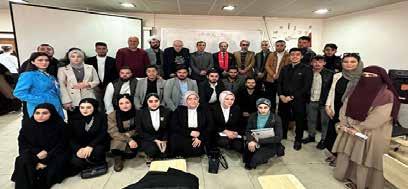
10 Heavenly Culture, World Peace, Restoration of Light
India, Religious Peace For Youth Awareness : an MOU Signing Ceremony & Peace Walk
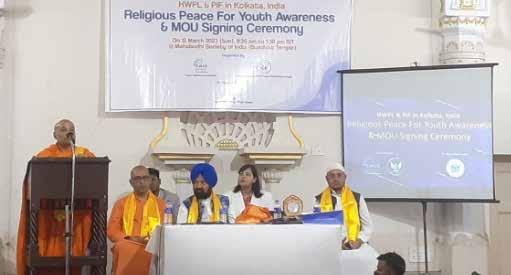
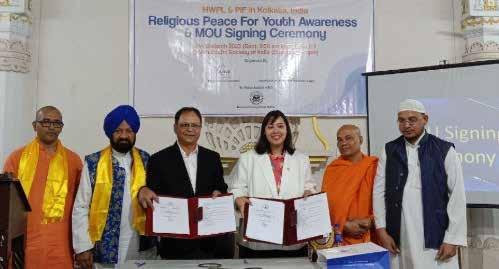
On March 12, at the headquarters of the Maha Bodhi Society in Kolkata, India, an MOU signing ceremony with the Peace Initiative Foundation, the opening of the HWPL WARP Office, and the Support for DPCW Peace Walk were held. About 70 people attended the event, where the DPCW was introduced and urged to be supported.
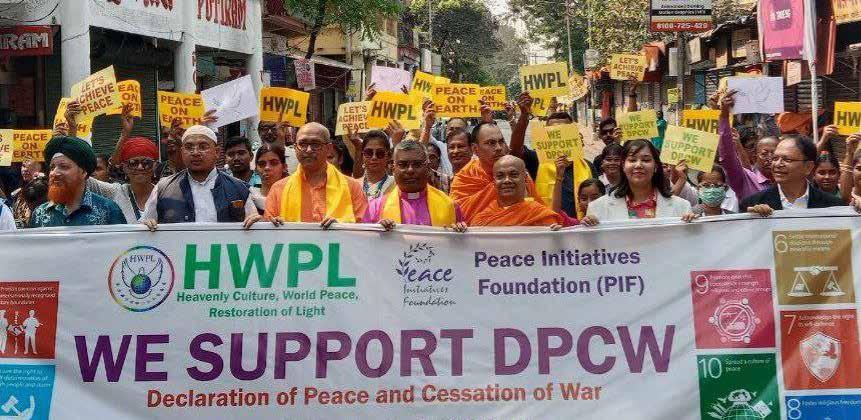
11 Heavenly Culture, World Peace, Restoration of Light
81st HWPL The Philippines Manila WARP Office



Topic: Salvation

12
1 Harold Recio / Christianity
2 Acharya Prem Shankaranand Tirth / Hinduism
2 3
3 Roberto Magbanua / Islam
1
02 Heavenly Culture, World Peace, Restoration of Light
In February of 2023, religious leaders from various faiths gathered for the 81st Philippines, Manila WARP Office discussions on the topic of “Salvation”. The reason why this topic was chosen is because salvation is one of the most important things that people of faith aim for, and a clear perspective on this topic is necessary. Just as a compass is necessary when setting off on a journey, a clear understanding of salvation is essential for the journey of faith, which is one of the most significant paths in life to take.
The discussion delved into the various beliefs and practices surrounding salvation in the panelists’ respective faiths.
Q. What is the image of salvation or the state to be reached in each scripture? And is this salvation by oneself or by God?
Roberto Ibrahim Mata / Islam
All praise is due to Allah. His peace and blessings be upon his holy prophet, Muhammad, and to all the prophets who came before him, and to all those who follow the path to righteousness until the last day.
Islamically speaking, salvation is the end of our struggle in this life because to understand salvation, we have to know first what the purpose of life really is. Any creation or person who does not know the purpose of their creation will be lost in this world. The Islamic point of view of the purpose of life is that we should know where we come from, why we are here in this world, and where we are going.
Where did we come from? We have to understand how life started. As human beings, we come from the creation of Adam. Adam was created from a combination of dust and water. To prove that the Almighty Creator is the most powerful creator, He just spoke His word to the mud, the combination of dust and water. “Be! and it is!” In Arabic, it is “kun fa-yakūnu.” This is the start of life. The same happened with Eve and thus, children are born into the world. This is how we understand where we come from.
13
Introducing WARP Offices worldwide
Why are we here in this world? Islamically speaking, it is written in the Quran why we are here in this world; because Allah created mankind only to worship Him. Where are we going? This life is very temporary, meaning, we will not stay in this world forever. This is also why we are here in the world, as it is the way we will be tested. As human beings, we are given the freedom to choose between right and wrong, evil and good. If we don’t prepare ourselves, we will be punished in this test. As what Jesus said in some of their writings, “Go into the narrow gate because broad and spacious is the road leading into destruction.” The latter refers to the ones who go to hell. Whereas narrow is the gate and road leading to life, and few are the ones who find it. Islamically, it is very clear to us that salvation depends on how we prepare for our life in this world. Death will come, and we cannot escape death.
Salvation is closely linked with our preparation, and it’s essential that we prepare ourselves appropriately. If you prepare your life in line with the laws and commandments of the Almighty Creator, you are given paradise. But if you disobey and you don’t follow especially all the teachings of the prophets and messengers, then you will be punished. In conclusion, from an Islamic perspective, the Quran helps Muslims to understand their origin, that is, we know that we were created by the Almighty Creator through Adam. We also know why we’re here in this world. This is because we’ve been given free will, and this is the reason why we’re being tested. Furthermore, we know that we’ll all taste death, as Allah said in the Quran, and we hope that we’ll be granted paradise as promised to us.
That is why the HWPL program is so valuable for everyone. It helps us to prepare our lives in this world, not just by doing good deeds, but by understanding how we should follow the laws and commandments of the Almighty Creator.
May God give us more wisdom and strength to do this work through HWPL in our lifetime, and may we see world peace together. The topic of salvation is so nice, and I agree strongly with our two great speakers, Brother Mata and Instructor Harold because there are similarities that I have also seen in my scripture.
Firstly, who is salvation for? Is it for the body or the soul residing in the body. Salvation is not
14
Acharya Prem Shankaranand Tirth / Hinduism
Heavenly Culture, World Peace, Restoration of Light
for the body. The topic of spirituality is not for the flesh. Religion is not the topic of the body; it is all directing us toward our mind.
The soul never dies. The mind perceives its own existence and that is why all scriptures say the mind must be pure. If the mind is pure, the heart where the Almighty God resides is pure. As written in many places of chapter 15 of the Bhagavad Gita, it is written, “I reside in the hearts of everyone.”
However, the mind is like running water. It goes everywhere. That is why there is religion and a spiritual system to control the mind, and to give it proper guidance on how to be in this world. And the body will do anything the mind commands. So, when the mind is not pure, it will be distracted and forget about salvation which is about being free from all bad qualities like anger, lust, greed, and attachments of all sorts. Salvation is being one with the Supreme Being. So, how can we become one with the Supreme being and become free?
We have to be free from the attachments and labels such as being a Hindu, Christian or Muslim. God is only one and once we see God in everyone and everything, you become free. Therefore, salvation is not after your death, but in this lifetime. After death, there is no guarantee we will receive salvation. Because if your mind has desires, greed, and attachment, there is no salvation even if you are the most holy person. We have to become one with that supreme being and we can only prepare ourselves in this lifetime only.
Harold Recio / Christianity
I would like to begin by quoting Revelation 7:15, which states that “they are before the throne of God and serve him day and night in his temple; and he who sits on the throne will shelter them with his presence.” This verse shows that those who belong to God will be with God, worshiping Him, obeying His commandments, and basking in His presence.
I agree with what Brother Mata mentioned earlier about salvation. It is not enough for believers to simply do good works. We must also follow God’s words and commandments, striving to obey Him in every way possible. This gives us a clear picture of how those who obey God will be with Him.
In the book of Genesis, we see that God lived together with man, as illustrated by the story of Adam and Eve. However, sin entered the world, and with it came death. This is why God gave
15
Introducing WARP Offices worldwide
us religion, which comes from the Latin term, “re” meaning “again” and “ligare” meaning “to connect”. The will of God is for us to be reconnected with Him once more. To be reconnected to God, we need to be born again of His word, as Jesus teaches in John 3.
Christianity is based on the Bible, which is a book of covenant or promise. Divided into the Old and New Testaments, these are the old and new promises of God, respectively, and both reveal God’s plan to restore His relationship with His creation. Hebrews 8:10 states, “This is the covenant I will establish with the people of Israel after that time, declares the Lord. I will put my laws in their minds and write them on their hearts. I will be their God, and they will be my people.” God’s will is for believers to be sealed with His word, which means that His word must be sealed in our hearts and minds, as explained in Deuteronomy 6:5-9 as well.
In conclusion, we must work towards salvation by being born again with the word of God. By being reborn with the word of God, we are then able to keep the covenant (promise) of God. By keeping His promise and will, we are able to be with God eternally.
In conclusion, the 81st Philippines, Manila WARP Office discussions on the topic of “Salvation” provided us with a deeper understanding of the concept of salvation in various faiths. We are grateful to the religious leaders who participated in the dialogue and shared their insights with us. Their willingness to engage in meaningful conversations and clarify difficult concepts helped us to clearly understand the common grounds and differences in our respective scriptures. Such dialogues promote greater respect and understanding for diversity in our society. We look forward to more fruitful discussions in the future.
Harold Recio / Christianity
*Disclaimer: To encourage free speech in an open interfaith dialogue, we have shared minimal information of participating panelists in our dialogues.
16
Heavenly Culture, World Peace, Restoration of Light
78th India, Bengaluru WARP Office
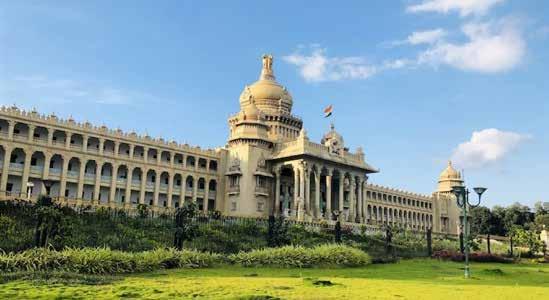
Topic: About Blessings



17
1 Dr.Salim Khan / Islam
2 David Jessuhu / Christianity
1 2 3 03 Introducing WARP Offices worldwide
3 Dr.Rajesh Madhukar Jalnekar / Hinduism
In the 78th India, Bengaluru WARP Office meeting held in January 2023, religious leaders took the time to explore the concept of blessings in various religions. This can provide a fascinating perspective on how different faiths approach spirituality.
During the discussion, one of the panelists, Dr. Rajesh Madhukar Jalnekar, emphasized that “this topic is not the distinction between Hinduism, Christianity, Sikhism, and Islam, but the distinction between believers and non-believers. We are all believers in God. And we must spread God’s message.”
As we will see in the discussions below, we will delve deeper into the concept of blessings in different religions, the conditions to receive them, and how they relate to the source of blessings.
Q1. According to your religious scriptures, what specific blessings are promised to believers? Is there a specific source or origin of these blessings recorded in your texts?
Dr. Rajesh Madhukar Jalnekar / Hinduism
Based on the teachings of His Divine Grace A.C. Bhaktivedanta Swami Prabhupada, Founder Acharya, International Society for Krishna Consciousness, a blessing is a special favor, mercy, benefit or gift bestowed by God, thereby bringing happiness. It can also be the act of invoking of God’s favor upon a person. Yet, different people have different understandings of what a blessing really is.
Everything is potentially a blessing if we recognize it. But we need to recognize and reciprocate properly. Otherwise, what appears to be blessing could be a curse.
Material blessings are always temporary and can give pain. So, what is true blessings? Blessings of spiritual persons, devotees of Krishna, Spiritual Masters and the Lord Himself. That which increases our love and service attitude to Lord Krishna. True blessings are what makes us advance in our devotion to Krishna. Therefore, true blessings are Krishna’s love,
18
Heavenly Culture, World Peace, Restoration of Light
Devotees’ prayers, Guru’s Instructions, and Krishna’s instructions.
Dr. Salim Khan / Islam
There are many blessings promised in the Quran and some of them we can’t discuss during this short time. But the source of all blessings is only God as per the Quran. The Quran says in Chapter 3 and Verse 26, “O Allah, O Lord of the kingdom. You give the kingdom to whom you will and take the kingdom away from whom you will; and you bestow honor on whom you will, in your hand lies the betterment. You are surely powerful over everything.”
So here are two examples that the source of blessings is God:
Firstly, the Quran is mentioned as a blessing. In Chapter 6 Verse 155, it is written that “And this is a Book which we have revealed as a blessing.” So, when we receive this book, we should follow it and be righteous. The responsibility lies with us to make good use of it. The Quran is also the biggest reminder of our accountability towards God, and the Day of Judgment. “This is a blessed reminder that We have revealed to you. Will you then reject it?” (21:50)
Another blessing is the prophets. God continuously sent prophets. So it says that: “Peace be upon Abraham! Even so, We recompense the good-doers; he was among Our believing servants. Then We gave him the good tidings of Isaac, a Prophet, one of the righteous. And We blessed him, and Isaac; and of their seed some are good-doers, and some manifest selfwrongers.” (Surah As-Saffat 37:109~113)
So, this chain from Abraham and the prophets that came before, and his progeny is also a great blessing to mankind. If we continue this further, it is written, “We also favored Moses and Aaron, and We delivered them and their people from great distress. And we helped them so that they were the victors, and we gave them the Manifesting Book, and guided them in the straight path, and left for them among the later folk ‘Peace be upon Moses and, Aaron!’” (Surah As-Saffat 37:114~120)
19
Introducing WARP Offices worldwide
So, these are the few blessings that are mentioned in the Quran, and we will discuss how to get them in the following question.
David Jessuhu / Christianity
Blessings are a fascinating topic because different people have different ideas about what they consider a blessing. We might see blessings as something we desire but do not yet have, or as something that makes us feel blessed when we receive it. Despite the casual way we use the word “blessing,” it’s crucial to consider what scripture promises as a blessing. This is especially important for believers, who should reflect on what their religious texts say about blessings and whether they truly deserve them.
The Bible promises blessings that believers should work towards in order to be deserving of them. These blessings refer to being part of the kingdom of heaven and gaining eternal life. Romans 6:23 states that “For the wages of sin is death, but the gift of God is eternal life in Christ Jesus our Lord.” This gift of eternal life is something we can’t fully comprehend.
To understand these blessings, it’s important to first understand what heaven is. John the Baptist, a prominent preacher during the time of Jesus’ first coming, told people to repent because the kingdom of heaven was near, which was also reiterated by Jesus. Heaven is where God resides and where those who are with God also reside. Since God was with Jesus at the first coming, belonging to Jesus meant belonging to God and being a part of the kingdom of heaven, where one can receive blessings of eternal life.
In 1 John 2:17, it states that “The world and its desires pass away, but whoever does the will of God lives forever.” The Bible frequently mentions eternal life, which is why God sent Jesus to give us eternal life.
20
Heavenly Culture, World Peace, Restoration of Light
Question 2. What are the conditions to receive the blessings? And please introduce any examples or cases that received blessings for qualifying the conditions.
Dr. Rajesh Madhukar Jalnekar / Hinduism
One man said to Prabhupada, “Swamiji, give me your blessing”. He replied, “I bless you that your material life is finished”. Person literally fell to the floor and started crying and begging not to receive that blessing. But Prabhupada would say, “follow my instruction. My instructions is my blessing. Because in following the instruction, which is Krishna’s words, all blessings will come upon you.”
Blessings do not come just by demanding them. You don’t even have to ask for them. When a person is pleased with you from their heart, God’s affection just pours forward. When the guru is pleased, that means Krishna is pleased and God’s blessings will come. If the guru is not pleased, there is no possibility of accessing the blessings of Krishna.
By not having ulterior motives and being in a state of consciousness to receive them, we will be blessed.
Dr. Salim Khan / Islam
ThenWechangedtheirsufferingintoprosperityuntiltheygrewandmultipliedandbeganto say:“Ourfathers(too)weretouchedbysufferingandaffluence.”… Behold!Wecalledthem toaccountofasuddenwhiletheyrealizednot(theirperil).”(Quran 7:95)
From this verse, it shows that they did not acknowledge the blessings of God and they did not take it seriously.
“IfthepeopleofthetownshadbutbelievedandfearedGod,Weshouldindeedhaveopened outtothem(allkindsof)blessingsfromheavenandearth;buttheyrejected(thetruth)and Webroughtthemtobookfortheirmisdeeds.”(Quran7:96)
21
Introducing WARP Offices worldwide
It also says in the verse, “HadthepeopleofthosetownsbelievedinandfearedGod.They wereinperil”because they did not believe and feared God but, if they did it then, God would have showered upon them blessings from heaven and earth. But they rejected the truth, so they were seized on account of their misdeeds. God wanted to give them blessings but their misdeeds led them to ruin.
For those who fear Allah, He prepares a way out and provides for them. Sometimes, we know help comes from here and there, but if somebody is a believer, then help comes from a source that is beyond imagination. We never truly thank God for this. We just forget and try to do things our way. It is said that those who put trust in Allah, he will surely accomplish his purpose. In other words, if someone puts his trust in Allah then, Allah takes care of him. Verily for all things, Allah appointed a due proportion. When we go to Him on the day of judgment, there will be unlimited blessings from God.
If you trust in God and feel like you have no source, don’t worry - the sources and blessings will come to you. The Quran emphasizes the importance of charity and gratitude, saying that those who are charitable will be rewarded with favors and those who help others will receive help from God. In fact, the Quran states “O Son of Adam, spend on charity and I will spend on you.”
If you continuously seek forgiveness from Allah, He will provide a way out of distress and relief from anxiety. Moreover, those who are attached to Allah and seek forgiveness will receive provision from unexpected sources. Therefore, asking for forgiveness from God is key to receiving His blessings.
When it comes to the sale of goods, telling the truth about any defects may seem like a loss, but Allah rewards those who speak truthfully with blessings. On the other hand, cheating and lying will result in the loss of God’s blessings. While this may not align with worldly thinking, it’s important to prioritize truthfulness and avoid dishonesty.
God promises to provide for us without us even asking for it, as long as we perform the prayer that makes us eligible and qualified for blessings. So, if we fulfill our prayer obligations, we
22
Heavenly Culture, World Peace, Restoration of Light
can receive blessings from God.
David Jessuhu / Christianity
As a Christian, we believe that blessings come from God, but it’s not just about doing good deeds or being a good person. According to Exodus 19:5-6, the ones who receive blessings are those who keep God’s commandments. It’s like an agreement between God and his people, with a set time to be kept.
In Hebrews 8:9-10, we learn that the new covenant is for anyone who believes in God and Jesus. Keeping this covenant is the condition for receiving blessings. So, what do we need to do to keep this covenant? Revelation 12:11 tells us that we need to overcome. This means overcoming the devil and his lies and believing in the testimony spoken to us.
In the book of Revelation Chapters 2 and 3, the promised blessings are given to those who overcome. These people are appointed by Jesus and go out to preach that the time for the second covenant has come, and the time for eternal life is here. They believe and follow the testimony spoken to them, and they will receive eternal life in heaven with God.
In conclusion, we need to recognize who God is and overcome the deception caused by Satan in this world. By keeping the covenant and recognizing the fulfillment of the prophecies, we can live with God and receive the blessing of eternal life without death, pain, or suffering.
In conclusion, we have seen that blessings are an important aspect of various religious traditions. According to the Christian and Muslim scriptures, blessings are bestowed by God upon those who have faith, are charitable, and seek forgiveness. On the other hand, the Hindu tradition emphasizes the importance of following the guru’s instructions as a means of accessing blessings. It is also important to have a pure heart and consciousness to receive blessings. Ultimately, regardless of our religious affiliations, we can all strive to cultivate gratitude and humility in order to receive and appreciate the blessings that come our way.
*Disclaimer: To encourage free speech in an open interfaith dialogue, we have shared minimal information of participating panelists in our dialogues.
23
Introducing WARP Offices worldwide
WARP office
Topic: About Symbols in Religion




24
1 Harjit Singh / Sikhism
2 Luka David Evans / Christianity
3
3 Indubhusan / Hare Krishna
1 2
67th Netherlands Amsterdam
04 Heavenly Culture, World Peace, Restoration of Light
To kick off 2023, panelists of the Netherlands, Amsterdam WARP Office gathered online for their 67th dialogue of scriptures. The topic for discussion was titled, “Symbols in Religion”, in which panelists gave very thoughtful and insightful answers which we are proud to share in this WARP Journal issue.
Symbols have been used to communicate abstract concepts that are difficult to express in words. They have also been used to bring together communities of people with shared beliefs and practices through religious art, architecture, clothing, and literature. In today’s world, where religious tensions and divisions are prevalent, it is important to have an open dialogue about the symbols and meanings behind various religious traditions. By gaining a better understanding of each other’s beliefs and practices, we can create greater harmony and respect for diversity. We hope you enjoy the insights shared by the panelists and we welcome your thoughts on the topic as well.

Q.
What symbol
represents your religion? Is there a meaning for the symbol based on the scripture? Please explain the symbol according to your scripture.
Indubhusan Das / Hare Krishna
In various groups, people sign their foreheads to indicate their beliefs and messages. This symbol is drawn on the forehead with two lines and represents Krishna, whom we follow. It’s a way for people to recognize us. Similarly, if you follow Shiva or Vishnu, there are different symbols to indicate that.
This symbol on the forehead is called ‘Tilak’. It is mixed with water and applied to the body
Introducing WARP Offices worldwide
after taking a bath. You can apply it to other parts of the body as well. It serves as a form of protection for us because we live in Maya, which means illusion. By wearing Tilak, we are protected and reminded of spirituality beyond this world. It helps us see beyond the flesh, which can be deceptive and alluring. Instead of being swayed by Maya’s temptations, we remember the teachings of our Guru and remain focused on the spiritual path.
Tilak also represents our respect for the body, which is a temple, and for God, who resides within our hearts. As a part of God, we are reminded that we have a divine purpose and that God has many forms, including the most beautiful form in the spiritual world. We can seek guidance from God when we are unsure of what is right or wrong, and we can learn how to choose wisely with the help of our Atma (soul). Through Tilak, we can better understand the meaning of life and how to transcend the cycle of birth and death.
Harjit Singh / Sikhism
Every religion has its own unique symbol, and in Sikhism, that symbol is called the “Khanda”. The Khanda symbol consists of two curved swords on both sides, and another double-edged sword in the center, which is also known as the Khanda.

The double-edge sword, or the Khanda, judges between truth and falsehood. The circle around the Khanda is the Chakar. The Chakar being a circle without a beginning or and end represents the oneness and completeness of God, who has the power to create everything in the natural world.
The Chakar is surrounded by two curved swords called Kirpans. These two swords symbolize the twin concepts of Meeri and Peeri - Temporal and Spiritual authority. They emphasize the equal emphasis that a Sikh must place on spiritual aspirations as well as obligations to
26
Heavenly Culture, World Peace, Restoration of Light
society.
To summarize, the Khanda logo consists of three swords, a circle, and a double-edged sword in the center, which represents the power of God to create and judge. The Khanda allows us to understand the relationship between Man, creation, and God. It is a powerful symbol.
Luka David Evans / Christianity
In Christianity, the most important symbol is the cross that Jesus bore. At the time, the cross was the cruelest punishment for the worst prisoners. It was the most painful and terrible punishment. Yet, Jesus chose death for the sake of all mankind, and this was prophesied. In Psalm 22, King David writes as if he is talking about himself, but in fact, it was not King David that fulfilled these words. In verse 18, it reads: “They divide my clothes among them and cast lots for my garment.” After Jesus was crucified, his outer garment was torn apart and divided by lots, as prophesied by David a thousand years ago. There were many other prophecies fulfilled as well, which is summed up in Luke 24:44. Jesus explains that “… Everything must be fulfilled that is written about me in the Law of Moses, the Prophets and the Psalms.” And so, it has been fulfilled through Jesus, and the cross is a lasting reminder of that.
During the discussions, Pastor Luka shared his observations about the similarities he noticed between the different religious texts. Pastor Luka mentioned how Indubhusan Das explained the Tilak and its significance in protecting oneself from Maya. He drew a comparison to the story of Cain from the Bible, where Cain was marked by God to protect him from being killed. This led him to discuss how God’s name on the forehead of his people in the Book of Revelations provides protection as well.
27
Introducing WARP Offices worldwide
Another interesting point that caught Pastor Luka’s attention was when Mr. Harjit Singh explained the Khanda, a symbol consisting of swords. Pastor Luka related this to the doubleedged sword in the Bible, which also judges between truth and falsehood. He noted that the Khanda is also a weapon of protection, similar to the spiritual weapons of the Christian faith, such as the shield of faith and the helmet of salvation. Pastor Luka also pointed out that the spiritual sword is the word of God and cited Revelation 1:16, where Jesus has a sharp doubleedged sword coming out of his mouth.
He concluded that despite the differences in religious beliefs, the similarities found in their respective scriptures are a sign that there is one God, and all religions ultimately lead to the same destination.
*Disclaimer: To encourage free speech in an open interfaith dialogue, we have shared minimal information of participating panelists in our dialogues.
28
Heavenly Culture, World Peace, Restoration of Light
Peace Interview
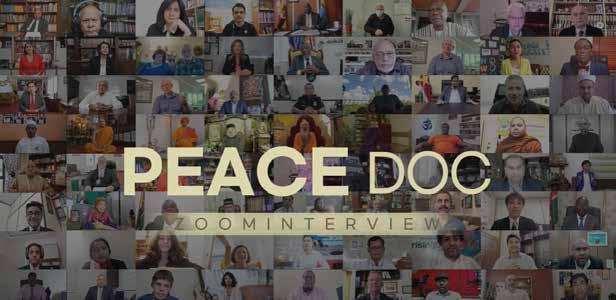
Religious leaders have been actively engaging in the WARP Office dialogues every month, where they share insights based on their respective religious scriptures. In addition to the WARP Office dialogues, these leaders have also participated in various peace initiatives and events organized by HWPL, including the Intercontinental Prayer Conferences.
We had the privilege of speaking with two such leaders who have been actively involved in these dialogues and peace events. Dr. Aditi V Mishal Adity Michal, the Chief Sustainability Officer of ISKCON - Govandhan Eco Village Sustainable Management Officer from India, and Prof. Dawud Olatokunbo Shittu Noibi, the Former Executive Secretariat of Muslim Umah of South West of Nigeria, have both made significant contributions to interfaith dialogue and peace-building efforts.
Through this interview, we aim to gain insights into their experiences and perspectives as panelists and participants, as well as their views on the importance of dialogue and cooperation among different religions. We hope that their stories and perspectives will inspire and motivate our readers, especially those who are already participating in the HWPL WARP Office meetings and interfaith events, to continue their efforts towards building a more peaceful and harmonious world.
29
Peace Interview
Dr. Aditi V Mishal
Chief Sustainability Officer of ISKCON - Govardhan Eco village, in India.

She has attended more than 15 WARP Office dialogue of scriptures since September 2021 as panelist, and has led representative prayers at the HWPL World Interfaith Joint Prayer Conference.
Q. What kind of influence do you think that the WARP Office meeting dialogues have on religious harmony and peace?
WARP Office is doing excellent work for peace, which is the most valuable thing for all human beings. Personally, I believe that SDG 16, “Peace, Justice, and Strong Institutions,” is the most important among the 17 UN SDGs. It aims to promote peaceful and inclusive societies, provide access to justice for all, and build effective, accountable, and inclusive institutions at all levels. WARP Office is contributing to this mission towards peace, which is crucial for progress and sustainable development.
Throughout history, religion has served as the purpose of progress for societies. It has led to the beautiful inquiry of, “Who am I? What is my relationship with God? How do I perfect my human life with the opportunity that has been given to me?” These inquiries have led to one taking up a particular faith that resonates most with my level of development in the spiritual cycle.
However, due to short sightedness, religions have also led to a lot of conflicts. So, the very mechanism of improvement in the thought process and improvement in consciousness,
30
Heavenly Culture, World Peace, Restoration of Light
uplifting one’s existence to a spiritual level, due to short sightedness and immaturity, has led to more conflicts in the world.
Therefore, I believe that WARP Office is helping to broaden the perspectives when it comes to the religious understanding. Helping leaders from different faith, to understand what are the beautiful similarities amongst the different faiths? At the same time, what are the differences when it comes to the details of application or some of the principles. At the principal level, there are far more similarities than differences. This was the beautiful message which has come through the various WARP meetings that I have attended.
Q. What do you think sets the WARP Office meetings apart from previous interfaith and religious harmony activities?
One thing which I have admired the most when it comes to WARP is the beautiful, intricate questions that have made discussions very meaningful. It’s very thoughtful of the WARP team to develop detailed and well-framed questions that encourage us as followers and leaders of our respective faiths to reflect on the true substance and meaning of our scriptures. Through these questions, we are able to delve deeper into what truly meaningful and gain insights from our scriptures. We can then share with the young and bright minds in the world, the younger generations, who have a lot of philosophical questions naturally. I felt that WARP Office meetings were very structured and meaningful due to these directed questions of inquiry.
Another thing which I love is the beautiful moderation that the WARP team is doing. The WARP teams are experts at picking up the essence from what we have spoken. This requires active listening skills and the ability to focus and understand, even when hearing something for the first time. The structure and direction that these questions provide have made the discussions in the WARP Office meetings more meaningful and impactful.
Q. What is some knowledge about scriptures you have gained through the WARP Office meetings, and what are some benefits of increasing knowledge about different religious scriptures?
I recall a very important discussion that we had during a WARP Office meeting on the topic of
31
Peace Interview
Religious Statues, which has been a sensitive issue for Hindu faith followers due to the attacks on our temples and communities in the past. It was fascinating to learn about the similarities and differences in the principles related to statues across different faiths, especially when I discovered that some faiths do not have strict guidelines against the worship of statues, unlike what had been assumed by some attackers of Hindu temples in the past. I appreciated the scholarly perspective that was brought in by the representatives of other faiths, which helped broaden my understanding of the subject beyond a narrow perspective.
I believe that sharing such knowledge through the WARP Office could prevent further damage to the beautiful heritage of Hindu deities and statues. These deities hold immense value and are worshiped by Hindus for their significance and history that spans over thousands of years. The discussion made me realize that this heritage is not limited to just Hindu faith followers but should be cherished as a global heritage. Therefore, I found the WARP Office discussion to be valuable in providing a broader scholarly perspective on the subject of statues and its significance in different faiths.
Q. What are some changes that you have experienced through the WARP Office meetings?
I felt the intensity and the engagement level has gone up with more thoughtful questions in recent discussions. Additionally, I have been impressed by the intellectual depth and thoughtfulness of my fellow faith leaders, which has increased my respect for other faiths.
I was fortunate to have a broad-minded perspective instilled in me by my spiritual father and through my own personal journey of exploration of other faiths, thanks to the book, “Amazing Journey.” This allowed me to appreciate the similarities between different faiths and the universality of spiritual principles, and how the Lord is one. However, through my participation in the WARP Office meetings, I have gained more scholarly insights into the reasons behind this broad-mindedness and have been able to open my mind even further to the study of other religious scriptures.
Overall, I am grateful for the opportunities that the WARP Office meetings have provided me to deepen my understanding of other faiths and broaden my perspective as a faith follower.
32
Heavenly Culture, World Peace, Restoration of Light
Professor Dawud Olatokunbo Shittu Noibi
Former Executive Secretary of Muslim Ummah of SouthWest of Nigeria. He has attended more than 100 WARP Office dialogue of scriptures since 2015, and was a session speaker at the September 18th HWPL World Peace Summit. He also spoke as a panelist at the Intercontinental WARP Office and led representative prayers at the HWPL World Interfaith Joint Prayer Conference.

Q. What kind of influence do you think that the WARP Office meeting dialogues have on religious harmony and peace?
What makes religious harmony very difficult to achieve is often ignorance on the part of both followers and leaders in various religions. Many times, when passing on the message of their religion to others, it is not done in a way that is appreciated by those of other faiths. However, it is important to recognize that all religions have come from the same God. In this regard, I believe that the WARP Office meetings have a significant influence on promoting religious harmony and peace. The WARP Office staff encourages religious leaders from different faiths to explain the basic doctrines and practices of their scriptures to those from other religions. Through these dialogues, we can eradicate ignorance, which is the biggest obstacle to religious harmony and peace. It has been heartening to hear other religious leaders say, “Ah, the believers in your religion know that this is what your religion teaches.” We often find that we have similar teachings in our own religion. Through these conversations, we can build fellowship and understanding between different religions.
33
Peace Interview
Q. What do you think sets the WARP Office meetings apart from previous interfaith and religious harmony activities?
I have participated in several interfaith activities worldwide over the years. However, my experience with the WARP Office dialogues has been quite distinct. The primary goal of the chairman is to advance the concept of heavenly culture. This resonates with me as religion is about guiding the relationship between man and God. It is God who created the world, including us, and gave us guidance on how to live our lives in harmony with other people while relating everything back to God. It is only in a state of peace and harmony that we can do God’s will on earth, just as angels do happily in heaven. Hence, the WARP Office dialogues, based on the concept of heavenly culture promoted by Chairman Lee, set it apart from other interfaith activities.
Additionally, the WARP Office dialogues encourage participants to determine which religious scripture is the most trustworthy. All religions have originated from the same God, and the guidance given to various prophets for their believers should not differ from one another. Therefore, we need to identify why these differences in teachings have arisen. By removing these differences, we will find that we are essentially saying the same thing. Only by seeking out the most trustworthy scripture can we answer this question. I deeply appreciate this principle that underlies the WARP Office dialogues.
Q. What do you think is the search for the most trustworthy religious scripture is? And do you think that it is possible to find the most trustworthy scripture and thus unify the religions?
Yes, I think it is possible to search for the most trustworthy religious scripture and ultimately find the most trustworthy religion. As I mentioned earlier, Islam teaches us that all prophets were sent by God and all religions originated from God. Therefore, if there are differences among the various scriptures, we must investigate the roots of these differences. Why are there such differences?
It is our responsibility to uncover the reasons behind them. If we do not do so, we may be held accountable on the Day of Judgment. “I have told you that all religions come from me. All prophets conveyed the same message. Why did you not find out? Why are there differences?
34
Heavenly Culture, World Peace, Restoration of Light
Find ways to remove these differences so that all of you may be on the same page.” This is something that I have not observed in other religious dialogues in which I have participated over the course of several decades. However, this is something that is actively promoted by the WARP Office dialogues, and Chairman Lee in particular. I believe that this is the foundation of the program, and I think it is achievable. If it were not possible, Allah would not have instructed us in Surah Al-Imran verse 64 of the Quran to do so and search for the truth. I believe that it is quite possible. And it would be beneficial. Inshallah.
35
Peace Interview
Heavenly Culture, World Peace, Restoration of Light
If you would like to have more information or have any inquiries regarding the HWPL WARP Offices, please contact us at religion_hq@hwpl.kr

